I had the opportunity to take part in a teleconference with Battlestar Galactica’s Ronald D. Moore and David Eick this week. The forty-minute touched on BSG’s upcoming prequel series, Caprica as well as the final ten episodes of BSG, itself. Somehow, Moore and Eick got through the ordeal without leaking any spoilers, but we still had fun.
What are you most proud about, about the way that the series ended?
David Eick: I would have to say that I’m probably most proud of the fact that I think we were able to answer most of the questions that we had raised over the years, and sort of to resolve most of the mysteries and sort of the grander questions of the show – and also at the same time give a resolution to all the character arcs, and sort of to wrap it all up by the end. I think you’ll find that in – we don’t sort of save everything until the last episode. We start answering questions along the way. Over the course of these last 10 we sort bring a conclusion to a lot of things that we had set up, over the years.
Ron Moore: Yes, I would add that it’s so rare that you get to end things in the way that you intended. There are myriad details of course that changed and shifted – but we talked about ending the show this way, I think, two years ago, and just the idea that we were able to actually dovetail it in that direction is very satisfying.
How did you feel about the way the season ended? I mean with the way the series ends? I Mean what does it do for you as a writer and a producer? And, you know, what does this show mean to you?
RM: I would say I found it very satisfying. I mean I was very pleased with the way that the show ended, you know, creatively and personally. It just feels like we’ve completed, you know, the piece.
And now to sort of be able to step back a little bit and look at it from beginning to end I feel good about, you know, the complete story that is Battlestar Galactica. So it’s just a tremendous amount of satisfaction in doing it. And creatively and on a personal level it’s just been a tremendous experience. And I’ve, you know, it’s easily been the highlight of my career.
The people that I’ve gotten to know and the cast and the crew and the production staff just, mean the world to me. And I was just very proud of all the people I worked with. And very proud of what we were able to put on the screen.
DE: It’s also telling that the show has provided such a great professional springboard for both of us. You know, we don’t tend to talk about that as much, but the reality is I started writing on this show. I hadn’t been a writer prior to it. Ron started directing. Both of us have had doors opened for us and met people I don’t think we ever would have met in the industry and have had some opportunities that will probably continue for some time.
That’s no small thing. It’s hard to find those situations, that kind of fertile topsoil. This show really, beyond just the show itself, has meant a great deal to us I think in terms of our future.
A follow up question: Why should fans tune in? I mean, you know, of course, you know, they probably already couldn’t be kept away. You know, but why should we tune in? What are we going to get?
RM: Well, why finish the end of the book? You’ve come this far. Don’t you want to see how it all turns out? I mean that seems like the most fundamental reason to watch the end – and it really is the end. It’s the conclusion of their stories. It’s what happened to them, finally. You Where did they end up and under what circumstance? Who made it and who died? Who’s the last Cylon and what did it all mean? I mean, if you’ve been a fan of the show, at all, up until now why wouldn’t you want to watch how it all concludes?
This kind of follows up on something David mentioned a moment ago. It’s a two-part thing: A, what’s in the future for both of you? And B, what’s the latest on Caprica?
RM: Well I think we both have various projects under way.
Caprica has been picked up for a full season. We start shooting that probably in July. We’re putting the writing staff together now and the crew and just staffing up and getting ready to go.
We’ll start breaking stories probably in February or maybe even as soon as the end of this month, depending when all the pieces go together. We have a game plan of what the general story line is and sort of some direction. So we’re not starting completely from scratch.
So things are well in hand in Caprica. We feel really good about that. Beyond that, I’ve got some future things in development and sort of waiting to see what will happen with Virtuality which is a pilot at Fox.
I’ll let David speak for himself.
DE: Nothing really – I’m going to shoot some pool. Try to do a lot of drinking. No, there’s a lot. We both have deals at Universal so there’s a pretty active development slate for both of us in terms of pilots. There are two at NBC right now that I have that are in serious contention and, various and sundry things elsewhere.
So it’s an act of time. But I think our most primary focus right now is Caprica because that really is the next at bat.
Speaking of Caprica I was wondering how is that story – I know it’s a prequel that takes place 50 years before – how is it going to tie into the mythos of what we learned throughout Battlestar Galactica? And how much will you have to know about Battlestar Galactica to appreciate Caprica?
RM: They’ll certainly tie in, but we set out deliberately to set up Caprica in a way that you didn’t have to see Battlestar. I think you could literally watch the pilot to Caprica without seeing a frame of film on Galactica and you would get it.
aou could invest in that story completely on its own and just go from there because we wanted it to stand as its own project and we didn’t want you to have to study up on Battlestar in order to enjoy Caprica.
There are questions remaining and hopefully they’ll be answered in these final 10 episodes. But how do you answer them without making it feel perfunctory?
RM: Oh, well I didn’t say it wouldn’t be perfunctory.
DE: I was going to say who said it wouldn’t be perfunctory?
RM: Yes what are you talking about? Some if it will just be on a crawl in the end credit… By the way, in case you were wondering.
That’s the trick of doing it. Tthe first decision was not to try to answer every single thing in the last episode because then the last episode just becomes, you know, a running tally of, oh and there’s this question, and oh and there’s that question and so and so and so and so. There were certain things that would be raised naturally earlier in the story line. Then you could deal with them on a case by case basis.
You just wanted each revelation and each answer to have its own kind of moment in the sun, and not to make everything a giant mystery – and let it proceed organically. It was a bit of a trick. But it didn’t seem like it was too burdensome as we went through it. It felt kind of natural.
As we broke out the last 10 episodes there seemed like there were natural places where we could explain this – oh, that revelation can go here; we’ll fill this detail in there, and we’ll still save these pieces for the end.
This goes back to an answer that you gave a little earlier. Battlestar Galactica is in essence a science fiction novel, a complete novel, with a beginning, middle and end. And that’s only ever been done once before with a show called Babylon 5. So I’m just wondering what is your feeling on being essentially a historical event in terms of TV history?
DE: I don’t know. My mind’s a blank.
RM: Yes, this is just the show that we work on. I tend to think of it just as a show that David and I put on for, our friends and family and for the cast members.
I mean, it’s just sort of our show – and I’m always surprised when anybody watches the damn thing.
This is the idea that it’s something larger, that’s interesting, but I’m not really emotionally connected to that idea.
DE: I think both of us have a tendency to be pretty pragmatic anyway. We like to keep normal hours. We don’t like a lot of drama in our life. We like have a happy group of people working together. There’s not a lot of Hollywood hysteria. I think along with that comes a certain pragmatism in how we look at the work.
It is a job. It’s a lot of hard work. It’s long hours. It’s a lot of sweat – and if you try to take a step back from it and say to yourself look at us, we’re making Peabody Award-winning work, or, gee, aren’t we special, I think you lose your way. So we I think try to keep our nose to the grindstone. I think it will probably be a couple years before we’re able to step back and assess it with any kind of objectivity.
What can fans expect for the remainder of the series?
RM: In terms of what? Oh, with the final four?
Well they’ll certainly be heavily into the story line. Wwhat can I tell you about that… I mean, with the discovery of Earth and the discovery of what Earth is, it certainly throws everyone’s lives into question.
I think where we wanted to get to at the mid-season break was, what if you took everyone’s fondest hope and dream away from them? Then what happens to these people? The final four are in the same boat with everyone else. That’s they’re having to re-evaluate – well, where do we go from here? What does this mean for us? And most profoundly for the final four is what are our specific origins? How did we come to be? What is our relationship with the rest of the Cylons? And what does this all mean for us specifically?
Those story lines will definitely play out in a very large way over the last 10 episodes.
When we get into Caprica, how do you think the fans will receive the whole Cylon thread? Considering that we already know how that pans out in the future?
RM: Well hopefully they view it as is intended, which is a period piece. You know, we’re doing a period piece, and in any period piece you know what lays in the future; if you’re doing Mad Men you know the ’60s are a-coming and you know that that whole world is going to collapse.
If you’re doing a World War II piece, you know the Nazis are going to lose,but, you still are able to tell, you know, fascinating and compelling stories as periods.
I think that’s what we’re doing for this as well. I mean that’s at least the intent.
As you guys are coming up on the finale, is there a sense of relief, sadness, excitement?
RM: All of the above.
DE: Yes.
Why did you choose to end it now like instead of drawing it out over a few more years? Like was there pressure from SCI FI for you guys to keep it going?
RM: The truth is we both just have too much money.
DE: Yes.
RM: I just don’t know what to do with all the money I have so, you know.
What’s the status in The Plan? Will that air between the finale? How does that fit in?
RM: I don’t know that we have an air date for The Plan yet. And I don’t know that we have an air date for Caprica yet. So I think those are probably up to SCI FI.
The Plan has been completed. It’s shot. It’s being edited. I haven’t seen the cut yet, but it is done. It’s in the can as it were. And I don’t know what their plans are for air dates yet.
Ron, are you still involved with The Thing?
RM: Yes.
What’s the status on that?
RM: Just working on some re-writes. And no, it hasn’t been green lit or, anything bigger then that. Futures just run on their own pace. Much slower then the TV pace.
I’m working on a re-write of the draft right now. They still like it and everyone’s still happy. We’ll just wait and see when and if it happens.
So, you’re just going to bounce back and forth between Caprica and that.
RM: Yes.
I’m just curious about your intentions with these Webisodes and the clues on the SCI FI site. I mean how much can viewers glean there? Will it ever be much more than what’s shown on television?
RM: I think there are things that are not on TV on the Web site certainly. Everything from deleted scenes to the Webisodes to podcasts and behind the scenes video blogs, and there’s a wealth of extra material.
I think we’ve designed it so that there is enough material there that you could go and enjoy but if, it’s not going to give away the store. It was vvery carefully thought out so that you couldn’t just go to the Web site and discern all the remaining mysteries.
But you could certainly get a leg up. And you could explore the universe a little deeper and understand things on a different level.
It’s interesting you say that because of the – as part of the Webisodes I know on the Internet I’ve seen all the way through 10, except for one particular one that wasn’t leaked. Do you know anything about that? I mean people are speculating it’s intentional?
RM: Of Webisode 10?
Webisode 9. Ten has actually been leaked out.
RM: Oh really?
Yes.
RM: No, I haven’t, to be honest. I haven’t tracked that very closely. I don’t think it’s a deliberate stratagem.
Well that just goes to show that how paranoid people are on the Internet. And I was just wondering if you monitor the Web sites to kind of see what those people are saying?
RM: I have a habit of monitoring Web sites on the night that a new episode airs. I’ll surf around a few Web sites just to pick up, fan reaction.
I get a kick out of sort of seeing message boards entries as the show is on the air. I’ll put a couple windows up on my computer and watch live reactions to people as they get to act breaks – I think that’s enjoyable – and receive some reviews and see what the general tenor of it is. After that I don’t monitor it very closely beyond that.
Have you ever read a theory you think that somebody got right?
RM: Oh sure. There’s, there’s theories out there of things, of guesses about different parts of the mythology or different revelations that are spot on. Fortunately they’re buried with so many other bad ideas that you just leave them alone – but I don’t know that I’ve seen anyone who’s nailed the whole thing. Or anyone who’s gotten exactly what the show is going to be at the end or anything.
DE: Yes usually the most vociferous and intensely felt theories are the ones that are furthest off.
RM: Yes. Yes those are always my favorite, the ones that are really adamant about it. Like… oh, really?
So, how long are we going to have to wait for the biggest mysteries? You know, the final Cylon?
RM: Aall I will tell you is that it is not in the final episode.
I think that would make a lot of people happy actually just hearing that much.
RM: Yes it’s not, it is not the final – the last frame or the last shot or anything like that.
One of the things that interests me about Battlestar Galactica is that it’s really the most religious show on television. Meaning that religion is such an important subject on the show. And I’m just wondering how did this get woven into the story? I mean it must be deliberate because when you think of science fiction shows they’re, usually just don’t even touch any of those themes.
DE: Do you want to tell them the Michael Jackson story?
RM: Yes. It was, it came very early on. The first draft of the mini-series and there was just a line in it, in a scene with Number 6 in Baltar where she said to him “God is Love”.
When I wrote it I didn’t really know what it meant. But I thought it was an interesting thing for a robot to say. And I just liked it and kept it in there.
When we got notes back from the network there was an executive at the time named Michael Jackson who really liked it and said this is a really interesting idea. You already have certain things going on with Al Qaeda and religious fundamentalism that are sort of thematic into the piece if you go further in this direction.
I thought well hell, I’m not going to get the note to have more religious content on the show very often. I just went for it. And then it played, it was also very organic. It played into things that were already inherent in the show. There was already the – there was a lot of terms, you know, taken from the Greek gods and the Roman gods that were already in the show and it felt natural to then make the colonials polytheists and then, if Number 6 says the God, singular, is love, it made her a monotheist. And I thought well, that’s fascinating already.
The monotheists versus the polytheists and we’re, you know, the colonial – the humans are the polytheists. And it just all became a really fascinating sort of blend of ideas.
Of these last 10 episodes would you say that overall there – if it’s a definite kind of end to the series? Or is it an open-ended ending to the series in overall tone? Are there questions we’ll still have when we’re done? Will there, you know, will that be the end of it all and we can all go home without any question marks in our heads?
RM: I think it’s pretty definitive.
DE: It’s pretty much over.
RM: Yes, This is it – this is the end of the story. I think that there might be some things that are still somewhat ambiguous or you might want to think about more that are not spelled out in bold letters, but, by and large I’d say the vast majority of the questions will have been answered. They may not be satisfying answers, but they will be answers.
Just a quick Caprica question, originally there was some talk that it – they were just creating a stand alone two-hour movie based off the best script in [unintelligible] – which kind of implied that they’d air that two hours and then do a series. At this point is it all going to air together in sequence as a series? Or would we see the already shot pilot beforehand do you think?
RM: I don’t know that they’ve made a call on that yet.
How did you choose who the final five Cylons would be? Was it like picking a name out of a hat? Or did you have it from the very beginning?
RM: I think David has a dartboard and we…
DE: The answer is it was a little of both.
RM: Yes, it was a little of both. The final four came up literally in a moment in a writer’s room where we were struggling with the end of season three, and trying to figure out certain things. I said, you know, because it was all about the trial of Baltar, and we had always set that up to be the end of the season…
The structure was working fine but it just didn’t seem to satisfy – and it didn’t quite seem as big an idea to me. I said, I just wish that there was, we had some bigger revelation here. I just got this image of like four of our people walking from different areas of the ship and all ending up in one room together.
They all close the doors and they look at each other and they say, okay we’re Cylon. And then we just reveal four of them in one fell swoop.
Everyone was kind of taken a back in the moment. Then, the more we talked about it, it just became well let’s… well why not. Why don’t we really do that?
We just talked about who they – who those final four would be with an idea of holding out the last one for the last season – then settling on the last one. We had a good idea going into the last season who the final Cylon was – but we were willing to look at other candidates and see who it could be and which one makes the most sense in the mythology.
Ultimately, we stuck with the original choice because it just made the most sense in terms of the history of the show and what it means for the characters.
During the reveal, “All Along the Watchtower” of course was playing. Does that song have any significance to you particularly or to the story? Or how did you choose that as their signal?
RM: I had personally been obsessed with the song for a while. So, I had – thought it was a fascinating song and the lyrics – I had wanted to work it into a project of mine for the last several years. In fact I wanted to do a whole Roswell episode about it.
So it was always in the back of my mind, and as we started talking about music and using music as a trigger, I immediately said, oh, and it has to be “All Along the Watchtower”.
Everybody laughed and then I was very much dogged about it, and kept going. Then we got the rights and that became the song.
I know that, watching the series, I kind of just want to watch it all at once. Is there a particular reason why you split up the season into two parts? Or is that just something that you had in mind of doing the whole time?
RM: It’s pretty much SCI FI. I mean it’s really been more about their scheduling and when they want to air the episodes.
We just got used to building in a mid-season cliffhanger; then left it up to them about how long the break in between the 10th and the 11th episode would be each year.
You know, we’ve heard a lot of rumors. And obviously we’re not looking for a spoiler here. But we’ve heard a lot of rumors about a very, very dark ending. And I suppose how dark can we get?
RM: I don’t know, is there a limit?
DE: Compared to where we are now I mean.
RM: Yes, exactly.
DE: You know, I don’t think either of us have ever entirely understood that word.
It’s funny, we had a controversial debate very early on in the show’s birth, the first season, about wanting to see more people – the society at large. people come, going on – and figuring out ways to still enjoy life despite their desperate straits.
The one thing we disagreed with, that note or that impulse, but to Ron and I it just seemed that okay, so if you show people celebrating and then suddenly something blows up, isn’t that worse than just having the thing blow up?
I think that it’s a kind of chic word to use in TV analysis because people like to analyze whether or not dark works on TV, or doesn’t work on TV.
I just think it’s such a subjective word. I don’t know if you would characterize the ending as dark or not. I would venture to say no.
But certainly we’ve said no emphatically before. And had people look at us like we were insane so. It’s in the eye of the beholder.
Obviously with all the scheduling difficulties and, between the writer strike and everything else… That must have had a large effect on how you, the decisions that you made regarding the story itself. And Number 1, is that the case? And Number 2, has it affected the way you would look at writing going forward?
RM: Oh I don’t know if it’s affected much going forward. I don’t think I took any grand lessons from it except that there is… well maybe I did.
I’d say the one thing is that I took for – took from the break… from the writer’s strike was that there is a need every once in a while to stop and take a breath and be sure you like where you’re going. Because we had structured out the end of the show, the last 10 episodes, and had locked them in and had begun writing some drafts.
We were working actively on them when the strike hit. Over the course of the strike, it gave me a chance to pause and reflect – and think that I just wasn’t satisfied with some of the directions we were going.
When the strike was over, we gathered the staff together right off the bat and said, you know what, I had some time. And I think we’re making a mistake with a couple of these story lines. So, let’s go back and let’s re-break them and re-visit them.
I was very happy for that. Maybe the lesson going forward is just, that. Every once in a while, take a time out, even though you think that there’s this relentless pace that you have to maintain, and you’re afraid to start over again.
Sometimes it’s worth it. I’m ultimately very happy that we did have that break and I did get a chance to re-visit some of those ideas. And I think we have a stronger story as a result.
Regarding the length of the final episodes… there’s been some mention as to possibly increasing these beyond just the finale itself. Have you been able to nail that down to an actual number of episodes that are going to have, you know, a longer – they’re going to be longer or is this going to be all of them?
RM: Well I’m not sure – essentially the finale, the last story, is three on air hours. It’s not in run time, but, if you cut it up into three it would be three episodes.
I think the intention is to show them all at once on the last night. I think there’s still scheduling issues about they might show one episode, I don’t – they’re still playing around with the actual air schedule of it. About how they program those three hours. But they will be shown, it is my understanding, there will be at least one showing of all three of them together.
That means that overall there are 10 episodes, with the 10th episode being 3 parts. I mean it’s all confusing of how you break it down. That’s essentially how it is. There’s 3 – there’s 10 stories left, let’s put it that way.
The other episodes are going to be the standard one-hour episodes?
RM: Yes.
Ron, [with] the transition that you’re going to be going through from Battlestar Galactica to Galactica the Series, being more of a period piece, how does that affect you as a writer just kind of dealing with the thematic transition of that?
RM: Oh it’s challenging. You know, it’s a different thing. We set out to do a very different show. You have to go back and start over. It’s a new cast of characters, new people, new story line.
You can’t just go on a glide path and say okay, let’s just keep doing what we’re doing… we know what this is all about because, you know, in this case we don’t. This is a different feel. It’s a different style. It’s a different method of story telling.
It’s a different group of characters. It’s a different mood. I mean everything about Caprica was designed specifically to not repeat what we had done in Galactica.
And so now it’s a challenge. Now it’s about wow, okay, now its back to square one. We have to re-invent this. We have to really make it work. – and, there’s no guarantees that people will accept it. We have to really, you know, rise to the challenge.
If you were re-imagining, I suppose, if Battlestar Galactica were to be re-made in 30, 25 years time. What would you least want someone to change about what you created?
DE: Oh God I have no idea. I would hope that they just come in and, you know, use their own best judgment.
If you’re going to re-invent, if somebody was going to do a new take on this version of Battlestar Galactica, I’d want it to be fresh.
I’d want them to do what I did when I approached the old series, which was to just go in and take no prisoners – and say, okay, I’m going to keep what works and I’m going to discard what doesn’t. This is what we’re going to set out to do.
I would feel – personally I would feel honored if someone does want to do that. It says that then you’ve created something that has stood the test of time and that people are still interested in [it]. People want to continue to tell stories in this universe and they’re interested in these characters. They want to keep trying to explore different aspects of the show that we weren’t able to explore.
About Caprica, I was just wondering if you could comment on, you know, with Battlestar you were writing it for the most part with a distinct ending in mind, a definite ending… with Caprica are – you mentioned how you’re trying to keep it different from Battlestar. So in that sense, do you – are you trying to keep this ending more loose and open-ended?
RM: Well right now we’re nowhere near even thinking about what the end of Caprica is, and that’s the way it was with Battlestar – although I guess with Battlestar we always knew that eventually you were going to have to find Earth or not.
With Caprica I guess we have the same challenge in that we know that there’s a war looming ahead of them. And the destruction of their entire race is looming ahead of them. But, you know, that’s 50 years away. And I suppose the show could run 50 years…
DE: Or at the end of that three we could just cut to 50 years later.
RM: Yes, 50 years later. But we have no – we haven’t had any discussions on what the end of Caprica is.
As for the characters, I mean do you find that you’re trying to also keep them very different from Battlestar’s characters? I don’t know if you can mention any examples.
RM: Well they are different. I would say that there’s probably going to be similarities only in the way we like to do characters. And the way we like to make them ambiguous and challenging and surprising – that still matters to David and I a lot. So I – we – will continue to try to do that. But I don’t know that there’s any particular, you know, stand in for any of the Battlestar characters. I don’t think, here’s their version of Starbuck and here’s Caprica’s version of Helo or anybody. It’s just… it’s its own thing.
DE: I mean there’s a character, for example, who is Esai Morales’s brother; who in the realization of the pilot turned out really fantastically. The actor was sensational. And I remember thinking as we were looking at it, you know, this is another great character. And there’s no one even remotely like this on Battlestar.
So I think that there’s always going to be a, hopefully if we’re lucky, a distinction – a distinctive quality to the characters. But I do think that they will all feel very different and apart from those you’ve come to know from Battlestar. I don’t think there’s the Tigh guy, for example, or the Tyrol guy.
Ron, having worked on Star Trek in years past, were there any, I don’t know, lessons that you took home from those spin-off series that you’re now able to apply to Caprica as a spin-off of the Battlestar universe?
RM: Probably first and foremost that you don’t try to repeat the formula. I questioned at the time Trek’s, when Star Trek – after Deep Space Nine when they developed the Voyager, and then subsequently Enterprise…
Both those projects felt too similar to Next Generation and to the original series for me, and by my lights. I felt that Deep Space was the way to do a spin-off series of an existing franchise where you really are doing a very different show. It’s a different format. It’s a different feeling. Deep Space Nine station lent itself to continuing stories. The Next Generation was episodic. They were just very different animals.
I felt that it was more creatively satisfying to do that instead of doing a, you know, a spin-off that just felt like a different version of the mother ship. That definitely informed the process as we went into Caprica.
There’s a lot of talk about Caprica. And I really wanted to know because there were some – there was some success with Razor. And most definitely will be with The Plan. Do you think that there are… will be any more opportunities for a prequel for Battlestar and for Caprica, you know, movie offshoots.
RM: Don’t know about Caprica. Haven’t had – haven’t even thought about that direction. I don’t know that there’s really any opportunity to do more Battlestar pieces.
We’ve struck the set. You know, I mean the sets are gone. So that alone, you know, raises a huge hurdle to try to do any more, because, I don’t know what, how they would scrape together the money to reassemble that ship.
There’s always virtual versions of the ship – you never say never – but I would say it’s very, very unlikely that there would be any more.
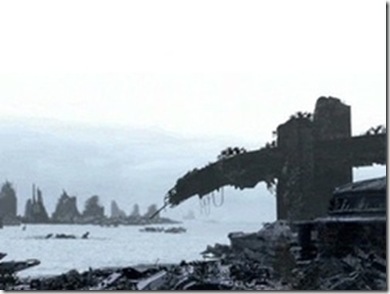
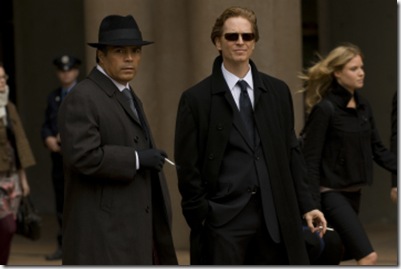
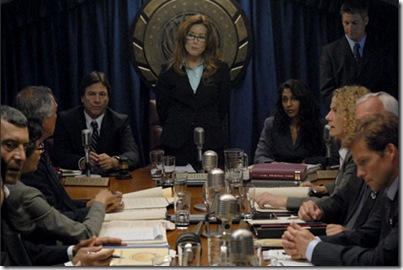
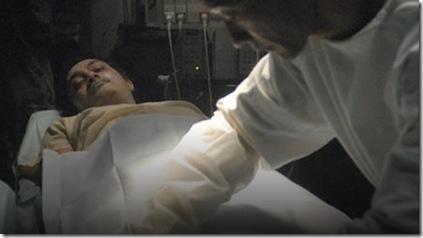
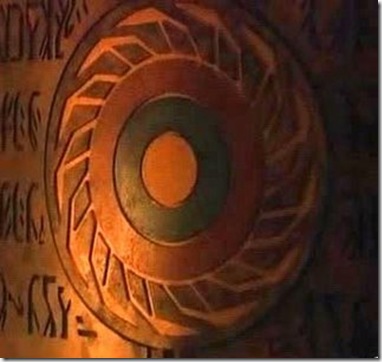
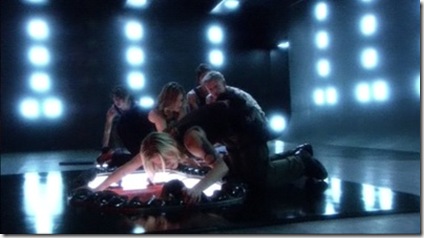
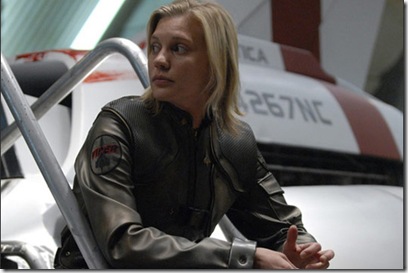
Thank you for postingthis interview. Really love the show and this interview gives me more insight.